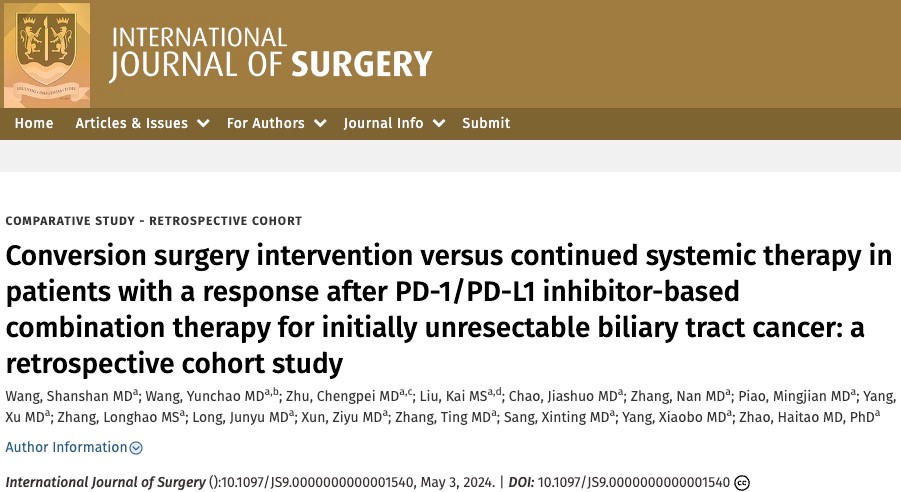Recently, the “International Journal of Surgery” (IF=15.3) published an original research article by the liver surgery team led by Zhao Haitao and Yang Xiaobo from PUMCH. The study found that for advanced biliary tract cancer (BTC) patients who are not suitable for curative resection, initiating immune checkpoint inhibitors (ICIs)-based combination therapy first and, and then perform conversion surgery for patients who exhibited a confirmed positive treatment response and meets surgery criteria is both safe and feasible. Compared with continued anti-tumor therapy alone, the addition of subsequent conversion resection following good response to ICI-based combinations confers additional survival benefits. This study represents the first international validation of the necessity of conversion surgery for unresectable BTC. The findings offer significant clinical insights and scientific value, paving the way for new treatment approaches in advanced BTC patients.

Due to its hidden onset, BTC patients are often diagnosed at an advanced stage and unable for curative surgery resection. Even for patients receiving the latest first-line immunotherapy + chemotherapy, the median survival time is still less than 13 months. In 1996, Bismuth et al. proposed the concept of “conversion therapy”, innovatively applying chemotherapy to render initially unresectable colorectal cancer
However, evidence supporting its application in the treatment of BTC remains scant. Two critical clinical issues remain unresolved: when advanced unresectable BTC patients show favorable response to ICI-based combined therapies and become resectable, whether the addition of conversion surgery is superior to continuation of systemic treatment alone is unknow and there remains a paucity of data regarding the feasibility and safety of conversion surgery following ICI-based combination therapy for BTC patients.
The research team conducted a retrospective study involving 34 pathologically confirmed unresectable BTC patients. Following immunotherapy (PD-1/PD-L1 inhibitors) combination therapy, all patients met the criteria for conversion surgery. Among them, 13 patients underwent conversion surgery, while 21 patients declined surgery and continued systemic antitumor. Comparative analysis of survival outcomes between the two groups was performed.
As of January 5, 2024, the median follow-up time was 40.5 months. The results showed that among the 21 patients who continued with systemic anti-tumor therapy, only 6 (28.6%) patients survived, with median progression-free survival and overall survival time being 12.4 months and 22.4 months respectively. Among the 13 patients who underwent conversion surgery, 9 (69.2%) patients survived; among them, 8 (61.5%) patients survived without recurrence, with median progression-free survival time estimated to exceed 3 years, and the overall survival time estimated to exceed 4 years, which are significantly longer than the survival time of patients in the continued systemic anti-tumor therapy alone (non-surgical group).
The study suggests that conversion surgery for unresectable BTC based on ICI-based combination therapy is feasible and safe. In the immunotherapy era, surgery may serve as a “unique” local treatment modality that complements systemic anticancer therapies within the whole-process management of advanced BTC, thereby allowing some advanced BTC patients to achieve a long-term disease-free survival.
Written by Wang Shanshan and Gan Dingzhu
Edited by Gan Dingzhu and Chen Xiao
Translated by Liu Haiyan
Reviewed by Xu Haifeng and Wang Yao
